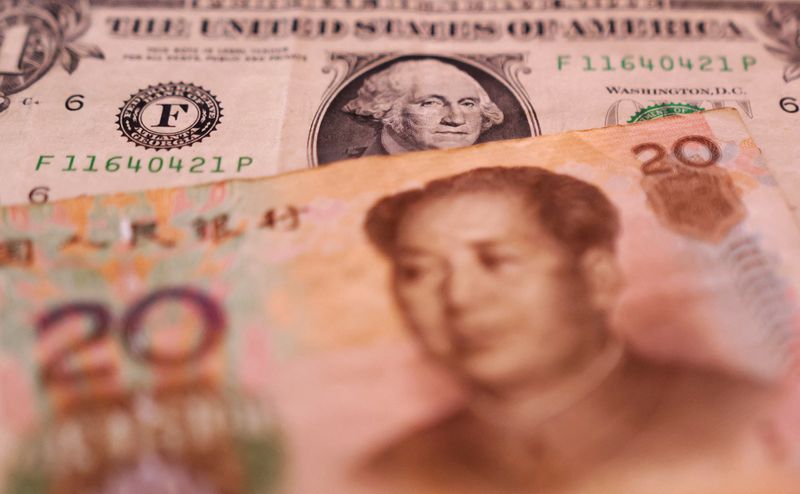SHANGHAI/BEIJING (Reuters) - China's currency regulators are asking some commercial banks to reduce or postpone their purchases of U.S. dollars in order to slow the yuan's depreciation, two people with direct knowledge of the matter said.
The informal instruction, or the so-called window guidance, is the latest in a series of steps taken by authorities this year to bolster a currency that has been hit by China's faltering post-pandemic economic recovery and rising yields for the U.S. dollar and other major currencies.
One source said regulators were emphatic banks should hold off dollar purchases under their proprietary trading accounts due to the "recent yuan depreciation".
The People's Bank of China (PBOC) did not immediately respond to a Reuters' request for comments, while the State Administration of Foreign Exchange (SAFE) told Reuters that exchange rate expectations were stable and it will push for a 'risk-neutral' mentality' at companies and financial institutions.
"The yuan exchange rate expectations are stable, and the foreign exchange market has the foundation to meet authentic and compliant FX needs," SAFE said in response to a Reuters query.
It reiterated it will keep the yuan basically stable at reasonable and balanced levels.
The tightly managed yuan hit an eight-month low in July, and has lost 3.6% against the dollar since the start of the year to rank as one of Asia's worst performing currencies. [CNY/]
China's authorities have pledged to let market factors dictate the yuan's moves, but their concern evident last month when the policy-making Politburo made a rare reference to the need for currency stability.
The window guidance "suggested that the central bank maintained its stance to support the yuan," said Ken Cheung, chief Asian FX strategist at Mizuho Bank in Hong Kong. "It also showed that the PBOC has ample tools to defend the currency," he said.
Keeping non-urgent dollar demand at bay could relieve some of the immediate pressure on the yuan, the sources said.
A central bank-led self-regulatory body had done something similar in 2021, asking banks to cap the size of their proprietary trading accounts to counter volatility in the yuan.
So far, monetary authorities have only tinkered with some rules, such as by allowing companies to borrow more overseas and setting firmer-than-expected daily yuan benchmarks, alongside some yuan-buying by state-owned banks.
"The PBOC is demonstrating firmness with its consistently firmer-than-expected yuan fixings,"said Alvin Tan, head of Asia FX strategy at RBC Capital Markets.
Tan however expected the yuan later this month would re-test July's trough of 7.25, as the dollar climbs and "investors lose their optimism about China's economy turning around decisively."
FLOWS SLOW
Investors were excited by the Politburo's talk of changes to real estate policy and more measures to boost demand in the economy. But that excitement soon faded, as domestic and foreign investors said they would wait for substantive action before putting more money into China.
Analysts at Goldman Sachs (NYSE:GS) said in a recent note that while authorities could slow the yuan's depreciation, there were significant headwinds that would keep it weak.
Foremost among those were the fragility of the debt-laden property sector, and the divergence in monetary policies as China feels the need to keep yields low and supportive of growth.
Investors clamouring to see the government deliver economic support measures sooner have been disappointed so far, and it shows in the weak performance of the country's stock markets.
The Shanghai stock and blue-chip CSI 300 index are not only lagging regional peers, but also global stocks markets.
Foreign investors' net purchases of domestic A-share stocks stands at around 230 billion yuan ($32.09 billion), and inflows virtually stalled after the economy lost its post-pandemic bounce.
Overseas institutional investors have also sold huge amounts of yuan bonds.
Largely due to outbound tourism and logistics, China's services trade deficit more than doubled to $102.1 billion in the January-June period, adding to pressure on the yuan.

There was also a seasonal factor too, as overseas-listed Chinese companies usually need more foreign exchange in the summer to pay dividends to shareholders.
($1 = 7.1673 Chinese yuan)